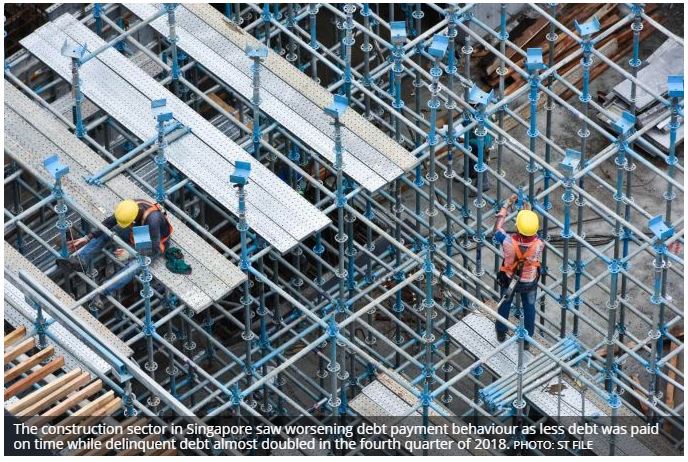Singapore: Debt payment behaviour of Singapore’s construction sector worsens in Q4 2018: study
THE construction sector in Singapore saw worsening debt payment behaviour as less debt was paid on time while delinquent debt almost doubled in the fourth quarter of 2018.
However, payment behaviour was largely stable across other sectors though DP Information Group cautioned in a media statement on Monday that small and medium-sized enterprises (SMEs) will potentially face bigger challenges in 2019 as uncertainties in the business environment are expected to persist.
DP Info in a report noted that just 25 per cent of construction debt were paid on time in October-December 2018, down from 36 per cent in the preceding quarter. The percentage of delinquent debt over 90 days for the sector at 35 per cent was nearly doubled the 18 per cent for the previous quarter.
Further, the sector registered a quarter-on-quarter Days Turned Cash (DTC) – a measure of the payment behaviour of SMEs – increase of 18 days from 41 days to 59 days. This represented the highest DTC for the sector in the last five years, and was the key contributor to the overall lengthening of payment settlement timelines by seven days from 33 days to 40 days among the SMEs. Most sectors witnessed a modest increase in DTC of about two days.
The construction sector has been weak in activities in recent years, largely attributed to lower than anticipated construction demand for both the private and public sectors.
However, there was an upturn of 23 per cent in construction demand in 2018, driven mainly by public sector projects, with the Building and Construction Authority (BCA) expecting this sustained public sector demand to continue into 2019. But smaller local players are still expected to face challenges as many infrastructure projects are being assigned to larger companies. The impact of smaller profit margins from these smaller firms may have led to the rise in delinquent payments among construction companies, said DP Info, which is part of information services company Experian.
James Gothard, general manager, credit services and strategy (South-east Asia) of Experian, said: “The payment behaviour across the majority of the sectors tracked suggests that despite the emergence of business headwinds at the tail end of 2018, most SMEs were still able to maintain sufficient cash flow to service their payment obligations in a relatively timely manner. However, SMEs will potentially face bigger challenges in 2019 as uncertainties in the business environment are expected to persist, leading to the management of cash flow, liquidity and credit risk remaining as top business concerns.”
DP Info’s SME Development Survey 2018 found that half of the SMEs surveyed had anticipated challenges in managing cash flow, liquidity and credit risk for the year ahead. The survey also determined that 81 per cent of SMEs with financial challenges cited delayed payments from customers as the main reason behind this difficulty.
Mr Gothard said: “With finance-related challenges constantly identified by our studies as a key concern for SMEs, it is heartening to see Budget 2019 introduce initiatives specifically aimed at easing SMEs’ access to credit and financing.”
He noted that this access to capital is also likely to prove vital as firms embark on productivity improvements and business transformation plans to retain their competitive edge in a challenging business environment.
Source: https://www.businesstimes.com.sg/sme/debt-payment-behaviour-of-singapores-construction-sector-worsens-in-q4-2018-study


 Thailand
Thailand




